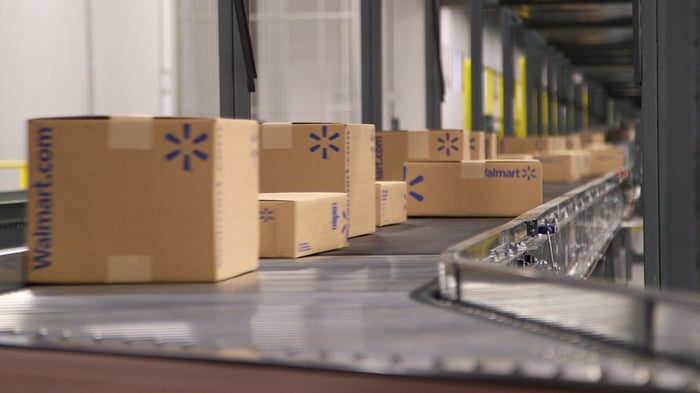One year ago, nearly to the day, Amazon.com (AMZN -1.35%) raised the free shipping minimum order size for non-Prime customers to $49, up from $35. This increase not only aimed to keep a lid on Amazon's shipping costs, which have been growing faster than revenue in recent quarters, but it also made Amazon Prime more attractive on a relative basis.
Amazon has now, without any sort of announcement, backtracked on that increase. The company has lowered the free shipping minimum back to $35, a boon for customers unwilling to fork over the $99 annual fee for Amazon Prime. But this move is unlikely to be a simple case of Amazon putting the customer first. The e-commerce giant is beginning to face a level of competition that it has yet to experience, with Wal-Mart (WMT -0.35%) leading the charge.

Image source: Amazon.
Wal-Mart's big bet on free shipping
Wal-Mart spent two years testing a Prime-like service of its own, but the company recently scrapped that idea and instead adopted a simpler strategy. Wal-Mart now offers free two-day shipping on orders over $35, with millions of eligible items and no fees. This matches the policy of Jet.com, which Wal-Mart acquired last year for $3.3 billion.
The timing of Amazon's retreat, less than one month after Wal-Mart's shift in strategy, is unlikely to be a coincidence. Wal-Mart's e-commerce business is far smaller than that of Amazon's, but its growth has reaccelerated in recent quarters. Global e-commerce sales grew by 20.6% year over year during Wal-Mart's third quarter, up from just 7% growth during the first quarter. The addition of Jet.com as well as major initiatives like online grocery have fueled the resurgence.
With Jet.com CEO Marc Lore now in charge of Wal-Mart's e-commerce operation, it should be no surprise that the company is getting aggressive. For Wal-Mart free two-day shipping on orders over $35 will be expensive, but it makes Amazon's non-Prime free shipping offer look far less generous. Even with the lower $35 minimum, Amazon's free shipping still promises delivery in five to eight business days.
This move from Wal-Mart also makes Prime appear less attractive, although Prime includes a long list of perks that have successfully kept subscribers on board so far, and it has no minimum order size. Wal-Mart is betting that a $35 minimum is low enough to convince shoppers that the benefits of Prime don't justify the cost.

Image source: Wal-Mart.
Amazon still has some major advantages. Its selection of products is far larger, with 50 million items eligible for Prime, up 73% from 2015. Prime Now gives subscribers free two-hour delivery on a variety of items in select cities. And Prime Video has become extensive enough to pose a legitimate threat to streaming giant Netflix.
But for shoppers only wanting the lowest price and fast free shipping, Amazon Prime has lost some of its luster thanks to Wal-Mart.
How does this end?
Amazon's strategy of continually making Prime more feature-packed has worked wonders so far. But as the gap between Prime's shipping benefits and those offered for free by Amazon's competitors shrinks, one has to wonder whether the company can keep it up. While plenty of Prime members wouldn't dream of leaving due to the added benefits beyond free shipping, whether those perks will be enough in a world where free two-day shipping is becoming table stakes is anyone's guess.
Wal-Mart's move will undoubtedly force other retailers to make their own free shipping offers more generous. And while Amazon's response so far has only affected its non-Prime shipping, I won't be surprised if the company ramps up its efforts to make Prime appear like a better deal. A quicker roll-out of Prime Now, perhaps.
One thing Amazon is unlikely to do is make its non-Prime free shipping much better. Moving to faster shipping would risk cannibalizing Prime, which has acted as the company's growth engine in recent years. This makes Amazon a less attractive place to shop for anyone who has no intention of joining Prime.
Of course, history shows that underestimating Amazon has always been a mistake. But it's clear from Wal-Mart's free shipping push that competition is only going to get fiercer.




